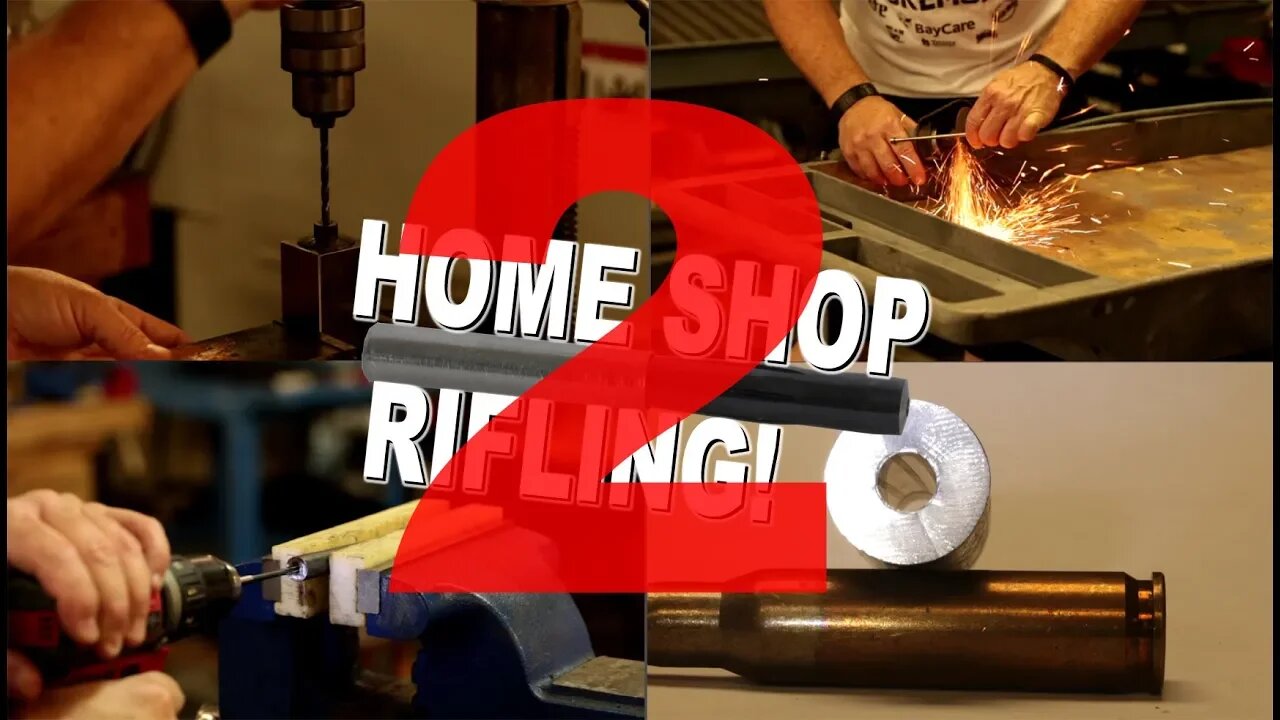Premium Only Content

Home Shop Rifling - Part 2
I recorded and edited the majority of this video in 2018, but rifling buttons in the marketplace have gone through a huge change. So some of the information is outdated but there is good stuff in there as well so I decided to share. People keep asking why heat treat before rifling. Didn't think I had room to address it here but here it is! A good barrel needs to be strong and tough. 4140 or 4150 steel at Rc 28-32 is a good hardness range. While being harder/stronger makes it harder for the button to go through because it takes more force to swage the rifling into the steel, the increased hardness also reduces the friction between the button and the steel and makes it easier to go through. But in the contest between reduced friction and increased force for swaging, I think the latter wins. But so what? It's a bit harder to push the button through but who cares? The machine doesn't care and the button survives just fine, and in the end you have a good, strong, tough barrel. Another HUGE reason is the tendency of the button to pick up steel from the bore if it's not strong enough. It involves coefficients of friction and normal forces, and is a little technical. Another issue with doing the hardening after? The main reason is that heat treating a barrel requires taking it to 1550 deg. F and more, and then quenching. Then tempering at around 1200 deg. F. Good luck maintaining that beautiful bore you just rifled after a process like that! And good luck keeping it straight! The other main reason for not heat treating after rifling is that all that strain-hardened surface the bore had from the button rifling process is now gone, stress-relieved during the heat soak at 1550 deg. It's been said that the surface of the bore has been measured to as high as nearly Rc 60, and that's in a barrel that's around Rc 30! A bullet traveling through a bore that hard will experience MUCH reduced friction over something even in the Rc 30 range. And you've got a bore that will be extremely wear resistant. There are some other minor reasons but I've written enough! ;-)
-
 8:09:50
8:09:50
Dr Disrespect
13 hours ago🔴LIVE - DR DISRESPECT - MARVEL RIVALS - GOLD VANGUARD
186K30 -
 1:15:00
1:15:00
Awaken With JP
12 hours agoMerry Christmas NOT Happy Holidays! Special - LIES Ep 71
169K136 -
 1:42:21
1:42:21
The Quartering
13 hours agoTrump To INVADE Mexico, Take Back Panama Canal Too! NYC Human Torch & Matt Gaetz Report Drops!
133K100 -
 2:23:15
2:23:15
Nerdrotic
13 hours ago $12.27 earnedA Very Merry Christmas | FNT Square Up - Nerdrotic Nooner 453
103K11 -
 1:14:05
1:14:05
Tucker Carlson
13 hours ago“I’ll Win With or Without You,” Teamsters Union President Reveals Kamala Harris’s Famous Last Words
195K361 -
 1:58:31
1:58:31
The Dilley Show
13 hours ago $33.68 earnedTrump Conquering Western Hemisphere? w/Author Brenden Dilley 12/23/2024
149K40 -
 1:09:59
1:09:59
Geeks + Gamers
14 hours agoSonic 3 DESTROYS Mufasa And Disney, Naughty Dog Actress SLAMS Gamers Over Intergalactic
101K21 -
 51:59
51:59
The Dan Bongino Show
15 hours agoDemocrat Donor Admits The Scary Truth (Ep. 2393) - 12/23/2024
890K3.01K -
 2:32:15
2:32:15
Matt Kohrs
1 day agoRumble CEO Chris Pavlovski Talks $775M Tether Partnership || The MK Show
134K34 -
 28:23
28:23
Dave Portnoy
1 day agoDavey Day Trader Presented by Kraken - December 23, 2024
165K44